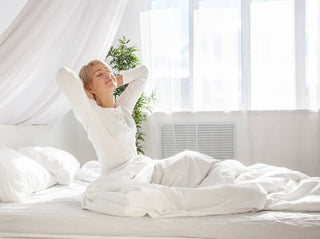May means Mother’s Day, flowers, and the approach of summer. With all that in the mix, it’s easy to forget that May is also Better Sleep Month.
When we think of wellness, we tend to focus on exercise and diet. But sleep is an important factor in physical, mental, and emotional health that works in tandem with diet and exercise. This means getting enough sleep should be a priority.
Are we fighting an uphill battle? Here are some statistics about our sleeping habits:
Half of Americans (48%) say they don’t get enough sleep, but less than half of them take any action to get better sleep.
More women feel that they are not getting enough sleep (53%) than men (44%).
Adults 35 to 54 years old feel more sleep deprived (52%) than other adults (44% for adults 18 to 34, and 42% for adults 55 and older).
We hate Mondays because we get the least sleep on Sunday nights (about 7 hours) and wake up, on average, 21 minutes earlier on Monday mornings.
So what can you do to try to get more quality sleep? Try these five steps:
1. Schedule Sleep
Don’t stay up until you feel sleepy. Instead, set a bedtime and stick to the schedule because consistency will help your body regulate its sleep cycle. Can’t fall asleep after 15 minutes? Take a quick break to do something relaxing before giving it another go.
2. Modify Eating Habits
While that late night pizza might not give you nightmares, being too full can cause discomfort and heartburn, making it difficult to sleep. Alcohol and caffeine can also disrupt sleep, so try to limit them close to bedtime.
3. Exercise
You know who sleeps best? People who exercise regularly! Just adding a few minutes a day can make a difference in your rest, but make sure your workouts end at least a few hours before bed – that adrenaline rush will make it tough to fall asleep!
4. Meditate
Some form of meditation, whether it’s yoga, deep breathing, or even prayer, can help relax your body for sleep. They can help slow your breathing, heart rate, and stimulate your parasympathetic system to help calm you.
5. Get Comfy
Make your room your cool, dark, and quiet sanctuary. Drapes, shades, earplugs, and a fan can make a big difference in your comfort level. A comfortable mattress, pillow, and soft bedding can also make sleep more pleasant. And remove any distractions – TV, books, and pets can sidetrack your sleep schedule.
Everyone’s needs are different, and there’s no single guideline for how much sleep you should be getting. Still, the National Sleep Foundation suggests that adults 18-64 should shoot for about 6-9 hours per night and seniors 65+ should sleep between 5-8 hours nightly.
So start getting more sleep tonight, and start seeing the benefits tomorrow. After all, science says so!

